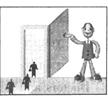题目内容
In the 1880s, people drank John Pemberton’s tonic to cure headaches. It wasn’t a very popular drink, and he sold only about a dozen drinks a day. That’s why Pemberton was willing to sell the rights to his medicinal drink. The buyer, Asa Griggs Candler, paid just $ 2,300 for the rights to Coca-Cola. Today, Coca-Cola (or Coke) is worth billions of dollars. It controls 50 percent of the world market in soft drinks.
How did Coca-Cola become so popular? One answer is that Asa Candler was a very clever businessman. He was one of the first people to use mass marketing. How did he do this? First, he made his product unique. When he bought the rights to Coca-Cola, it came in ordinary bottles. It looked like every other drink on the market. To make Coca-Cola look different, Candler modernized the bottles. He also made an eye-catching logo for his products. When other companies tried to imitate Coca-Cola’s name, Candler took them to court.
In addition to the unique bottle and logo, Candler spent a lot of time and money advertising his product. He used advertising to make a powerful image of Coca-Cola in the minds of his customers. He gave away free bottles of Coke. He put the name of his drink on pencils, trays, Japanese fans, matches, and many other things. Then he gave the things to people for free. He advertised Coca-Cola in the newspaper and painted the words “Drink Coca-Cola” on the sides of buildings and barns. By 1902, Coca-Cola was the best known product in the United States.
Candler was also able to make memorable advertisements. They often had catchy slogans such as “The Pause That Refreshes.” He also used famous athletes to advertise his product. They helped people to think of Coca-Cola as a delicious drink for everyone.
Today, businesses all over the world use mass marketing, but the makers of Coke were the first.
小题1:Candler bought the rights to Coca-Cola from _______.
小题2: The underlined sentence in paragraph 2 implies that __________.
小题3: Candler used slogans to advertise his product. Slogans are _______.
小题4: By using mass marketing, Asa tried many ways EXCEPT _______.
小题5:The passage is mainly to _______.
How did Coca-Cola become so popular? One answer is that Asa Candler was a very clever businessman. He was one of the first people to use mass marketing. How did he do this? First, he made his product unique. When he bought the rights to Coca-Cola, it came in ordinary bottles. It looked like every other drink on the market. To make Coca-Cola look different, Candler modernized the bottles. He also made an eye-catching logo for his products. When other companies tried to imitate Coca-Cola’s name, Candler took them to court.
In addition to the unique bottle and logo, Candler spent a lot of time and money advertising his product. He used advertising to make a powerful image of Coca-Cola in the minds of his customers. He gave away free bottles of Coke. He put the name of his drink on pencils, trays, Japanese fans, matches, and many other things. Then he gave the things to people for free. He advertised Coca-Cola in the newspaper and painted the words “Drink Coca-Cola” on the sides of buildings and barns. By 1902, Coca-Cola was the best known product in the United States.
Candler was also able to make memorable advertisements. They often had catchy slogans such as “The Pause That Refreshes.” He also used famous athletes to advertise his product. They helped people to think of Coca-Cola as a delicious drink for everyone.
Today, businesses all over the world use mass marketing, but the makers of Coke were the first.
小题1:Candler bought the rights to Coca-Cola from _______.
| A.the inventor of a medicinal drink | B.a well-known businessman |
| C.a doctor | D.a carpenter |
| A.he invited people from other companies to attend a court ball |
| B.he shared Coca-Cola’s name with other companies after they went back from the court |
| C.he played basketball with people from other companies on the basketball court |
| D.he took legal action to those who wanted to copy Coca-Cola’s name |
| A.popular music | B.free products | C.memorable phrases | D.simple things |
| A.making Coca-Cola look different |
| B.paying $ 2,300 for the rights to Coca-Cola |
| C.advertising Coca-Cola a powerful image in the minds of the customers |
| D.using famous athletes to advertise his product |
| A.explain that it is easy to use mass marketing |
| B.advice people to spend a lot of money and time on mass marketing |
| C.tell how Asa changes Coca-Cola into a worldwide business by using mass marketing |
| D.describe different ways of using mass marketing |
小题1:A
小题1:D
小题1:C
小题1:B
小题1:C
略

练习册系列答案
 亮点激活精编提优100分大试卷系列答案
亮点激活精编提优100分大试卷系列答案
相关题目
 lls for the rest of your life.” How did these expectations 41 my development? I was never 42 to work on cars or be around 43 . When I was 18, I took the US Army’s Mechanical Aptitude Test. My scores were in the bottom for the entire nation!
lls for the rest of your life.” How did these expectations 41 my development? I was never 42 to work on cars or be around 43 . When I was 18, I took the US Army’s Mechanical Aptitude Test. My scores were in the bottom for the entire nation!
 cities to attract more graduates from big cities, Zhang
cities to attract more graduates from big cities, Zhang

 When you cough or sneeze, you’d better turn your head away from others and cover your mouth with the full part of your hand. And then, you should say, “Excuse me.”
When you cough or sneeze, you’d better turn your head away from others and cover your mouth with the full part of your hand. And then, you should say, “Excuse me.” (细菌) a
(细菌) a long to everyt
long to everyt hing and everyone they touch.
hing and everyone they touch. ng, pull it open, stand to the side, and allow the other person to pass through first, then you can walk through. If the door opens by pushing, hold the door after you pass through.
ng, pull it open, stand to the side, and allow the other person to pass through first, then you can walk through. If the door opens by pushing, hold the door after you pass through. doctor
doctor eggs in small bags in their stomachs until they hatch. Even after the babies are born, they stay inside the bag until they are ready to live by themselves.
eggs in small bags in their stomachs until they hatch. Even after the babies are born, they stay inside the bag until they are ready to live by themselves. s (鸵鸟), are so protective of their children that they have even been known to attack small airplanes on the grou
s (鸵鸟), are so protective of their children that they have even been known to attack small airplanes on the grou nd if they get too close to their home!
nd if they get too close to their home! o, by practicing kindness toward all animals.
o, by practicing kindness toward all animals. d brave animals are
d brave animals are